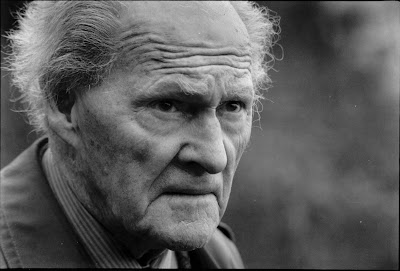In this morning's Gospel reading (John 14) it's the disciple Thomas who speaks out: “Lord, we do not know where you are going. How can we know the way?”
If there's a temptation to associate Thomas with a tendency to doubt, then first I would want to say that the key thing about him is his honesty.
Reflecting on this and Jesus' promise that "in my Father's house there are many dwelling places / rooms" - or indeed "mansions" (AV) - I found myself talking about the priest and poet, R. S. Thomas:
... His final reputation was that of reclusiveness mixed with a tendency to venture onto the public scene with some outrageous political views. His Welsh nationalism was mixed with a keen regret that he found himself able only to write poetry in English. For all his long ministry as an Anglican priest he was not immune to uncertainty in matters of faith. But he would not hide from the contradictions he recognised in himself. Not least as a man of words, he relentlessly explored the silence he perceived: silence in which he prayed, but also silence which could denote the terrifying absence of God, silence in the refusal of answers to appear, a silence which he might long to find broken, but in which he had the courage to dwell. It would be rash to state any final conclusions as to the sort of faith with which he ended his life. But we do have some clues from his own words….
R. S. Thomas concludes what he calls his Autobiographical Essay with a picture of himself kneeling in a room furnished with chairs and books, seeing Orion and Sirius above the bay, and knowing it ‘difficult to hold the two in proportion.’ It is an image he reproduces in a poem from his last collection, ‘At the End’:
Few possessions: a chair,
a table, a bed
to say my prayers by,
and, gathered from the shore,
the bone-like, crossed sticks
proving that nature
acknowledges the Crucifixion.
All night I am at
a window not too small
to be frame to the stars
that are no further off than the city lights
I have rejected….
Thomas never comes to easy conclusions about God. He resists the temptation to domesticate a God he finds strangely revealed in the created order, a God who so often eludes him in prayer. But at the same time he finds the reality of God meeting him just where he is – living amongst the few possessions which are necessary, in a small room, with a window not too small to frame stars which seem so near. It’s a poem of maturity after a life of searching – and it points to God in utter simplicity, and says, “We meet him here. We know God because he reveals himself in those things which have become familiar to us.”
Just an excerpt of what I had to say. Click here to find the whole of it.

No comments:
Post a Comment